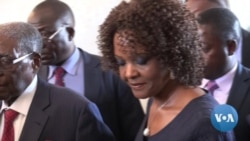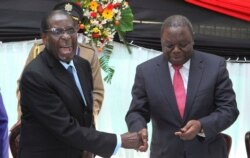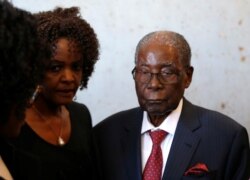Robert Mugabe, who ruled the southern African nation of Zimbabwe for 37 years following the end of white minority rule in 1980, has died. He was 95 years old. Some hail him as a liberation hero who stood by his principles -- but others say he rigged elections, destroyed the economy of what was once Africa’s breadbasket and terrorized his people for decades.
Mugabe, Zimbabwe's first president, leaves behind a complicated legacy after 37 years of increasingly autocratic rule.
In his younger years, he led the guerilla movement that resulted in Zimbabwe's independence. At the time, he was hailed as a liberation hero, both inside and outside the former British colony once known as Rhodesia.
Early on, he urged Zimbabweans to reconcile after the civil war that raged during the final colonial years. He also initially expanded the country's education and health systems, making them among the best-regarded in Africa.
But as time went on, Mugabe grew intolerant of dissent and faced increasing allegations of human rights abuses, repression and election rigging.
Farm output plunged after land reforms transferred white-owned commercial farms to blacks who lacked the experience and funding to make the farms productive. For many Zimbabweans, cash, jobs and fairly priced commercial goods remain impossible to get -- and for that, many blame Mugabe.
Speaking to VOA in 2018, Mugabe defended his years in power.
“I have, during that time, through all this time, cried for return, our return, to constitutionality, our return to legality, our return to freedom for our people, an environment in which our people can be free," Mugabe said.
Twenty-eight-year-old clerk Pedzisai Chakwenya said he had mixed feelings about the man who ruled Zimbabwe for most of his life.
“Robert Mugabe was right at first, but somewhere he went wrong," he said.
As he aged into his 90s, Mugabe grew frail and his wife, unpopular with the public, positioned herself to eventually take power.
The military prevented that by taking control of state institutions and forcing Mugabe to resign in November 2017. He was replaced by his longtime deputy, Emmerson Mnangagwa.
Mnangagwa, notably, declined to prosecute Mugabe.
“He is the founding father of Zimbabwe, he is our founding father of free Zimbabwe," he said.
Mugabe will be buried at Harare’s Heroes’ Acre cemetery, his final resting place overlooking a country that, for decades, was inseparable from the man at the top.







